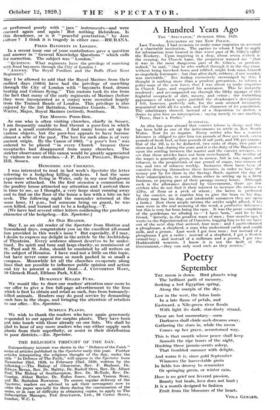A Hundred Years Ago
THE " SPECTATOR," OCTOBER 10TH, 1829.
ANECDOTES OF THE NEW POLICE.
Last Tuesday, I had occasion to make some enquiries on account of a charitable institution. The parties to whom I had to apply for information were located in that worst part of St.. Giles's called the Rookery. Upon inquiring in a shop, about seven o'clock in the evening, for Church Lane, the proprietor warned me " that it was in the most dangerous part of St. Giles's, so perilous, indeed," he said, " that he who walked through it in the day-time, without being knocked down and robbed, might look upon himself as singularly fortunate ; but that after dark, robbery, if not murder, was inevitable." Not feeling excessively encouraged by this, I thought it nothing more than a prudent precaution, to inform a. police-man of the new force, that I was about to make enquiries in Church Lane, and required his assistance. This he instantly rendered ; and accompanied me through the filthy zigzags of this frightful receptacle of dirt., misery, and crime ; the forbidding appearance of which quite justified the shopkeeper's description. Last Tuesday, I had occasion to make some enquiries on account of a charitable institution. The parties to whom I had to apply for information were located in that worst part of St.. Giles's called the Rookery. Upon inquiring in a shop, about seven o'clock in the evening, for Church Lane, the proprietor warned me " that it was in the most dangerous part of St. Giles's, so perilous, indeed," he said, " that he who walked through it in the day-time, without being knocked down and robbed, might look upon himself as singularly fortunate ; but that after dark, robbery, if not murder, was inevitable." Not feeling excessively encouraged by this, I thought it nothing more than a prudent precaution, to inform a. police-man of the new force, that I was about to make enquiries in Church Lane, and required his assistance. This he instantly rendered ; and accompanied me through the filthy zigzags of this frightful receptacle of dirt., misery, and crime ; the forbidding appearance of which quite justified the shopkeeper's description. felt, however, perfectly safe, for the man seemed intimately acquainted with all its nooks, and the character of its population. The inhabitants showed, instead of a disposition to molest, a desire to give him no interruption ; saying merely to one another, " There, that's a Peeler."
AUSTRALIA.
An idea has gone abroad that convict labour is cheap, and this has been held as one of the inducements to settle in New South Wales. Now let us inquire. Every settler who has a isniviet labourer is obliged to give him ten pounds of flour per week, seven pounds of fresh beef, or four pounds of salt pork, and 101. per annum. Out of the 101. is to be deducted, two suits of slops, two pair of shoes and a hat, during the year, and it is the duty of the Magistrai e, upon the settling between the master and the convict servants, to see that these articles have not been overcharged. The residue of the wages is generally given, not in money, but in tea, sugar. and tobacco, in the proportions of one pound of sugar, two ounces of tea, and two of tobacco weekly. Instances there have been of convicts denying themselves these luxuries, in order to have the money put by for them in the Savings Bank, against the day of their emancipation, to assist them either in setting up in a little business, or paying part of their passage-money home. Although such is the allowance directed by Government, there are few settlers who do not find it their interest to increase the rations to 121bs. of flour or a peck of wheat ; the latter is preferred by the convict, as it enables him to give the bran to his dog. (Every man has his dog, and intolerable nuisances they are upon a farm.) Now these ample rations the settler might afford, if his Man were in the real meaning of the word, a productive labourer ; but this is very far from being the case. It was the great complaint of the gentleman we alluded, to—" I have been," said he to his friend, " latterly, in the greatest want of men ; four months ago, I wrote to the Superintendent of Convicts, begging him to let me have out of the next ship that arrived, four men ; and I particularized a ploughman, a shepherd, a man who understood cattle and could milk, and a groom. Last week I got four men : but instead of a ploughman I gOt a tailor ; instead of a shepherd, I got a &cite!), errand-boy ; and instead of a milkman and a groom, I got two Huddersfield weavers. I know it is not the fault of the Government,—they can only send such as they receive."








































 Previous page
Previous page